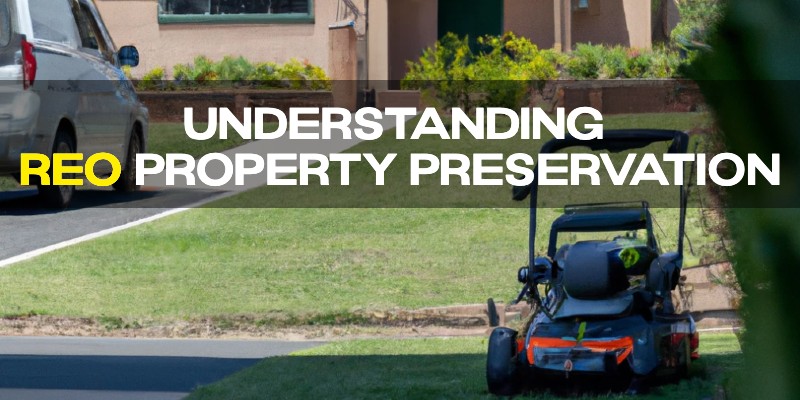
Introduction to REO:
What is REO Property Preservation?
REO property preservation involves maintaining and repairing Real Estate Owned (REO) properties that are owned by banks, lenders, or other financial institutions. This process can include lawn maintenance, winterizing the property, securing it, and performing necessary repairs and improvements. The ultimate goal is to bring the property to a marketable condition, ready for sale.
Why is REO Property Preservation Important?
The importance of REO property preservation cannot be overstated in the real estate industry. As the economy fluctuates and foreclosure rates rise and fall, the need for preserving bank-owned properties becomes ever more crucial. Proper maintenance and care prevent the properties from deteriorating, ensuring they remain a viable asset. It not only protects the bank's investment but also has a positive impact on the local community by maintaining neighborhood aesthetics. This information is vital for real estate professionals, banks, and homeowners alike, as a well-preserved REO property can be a valuable opportunity for all parties involved.
Understanding REO Properties:
Defining REO Properties
Real Estate Owned (REO) properties refer to real estate assets that have been repossessed by a bank or lender after a failure to sell at a foreclosure auction. These properties usually become the bank's responsibility, where they are managed, maintained, and eventually sold.
How Properties Become REO
The path to becoming an REO property starts with a homeowner defaulting on mortgage payments. The bank or lender then forecloses on the property. If the property fails to sell at the foreclosure auction, it returns to the lender's possession and becomes a bank-owned property. The journey from foreclosure to REO status is filled with legal processes and administrative tasks that can be complex and time-consuming.
Typical Condition and Challenges
The condition of REO properties can vary widely but often leans towards neglect. Previous homeowners may leave them in poor condition, and properties can also be subject to vandalism or theft. Addressing these issues requires a comprehensive approach, involving inspections, assessments, and the right combination of repairs and renovations. The legal complications can also pose challenges, with liens, encumbrances, and code violations sometimes adding to the complexity of restoring the property to a sellable state.
The Process of REO Property Preservation:
Steps Involved
- Initial Inspection: A thorough assessment to understand the property's current condition, including any damages, repairs needed, and the overall structure's integrity.
- Repairs and Renovations: From minor fixes to major renovations, this stage includes bringing the property up to market standards.
- Ongoing Maintenance: Regular upkeep, including lawn care, plumbing checks, electrical maintenance, and seasonal care such as winterizing, to maintain the property's appearance and functionality.
- Final Sale Preparations: Staging and preparation for the real estate market, including possible improvements to enhance curb appeal.
Legal and Regulatory Requirements
The process of REO property preservation requires stringent adherence to local laws and regulations. These can include building codes, zoning laws, health and safety standards, and environmental considerations. Understanding and complying with these regulations is vital, requiring expert knowledge and careful oversight.
Role of Professionals
The process involves various professionals, each playing a critical role. Contractors, property managers, real estate agents, legal experts, and others collaborate to ensure quality work and legal compliance. Their combined expertise is often necessary to navigate the complicated landscape of REO property maintenance.
Benefits of REO Property Preservation:
Advantages
- Maintaining Property Value: Proper preservation ensures that the property retains its value and doesn't become a depreciating asset on the bank's books.
- Preventing Vandalism and Deterioration: Regular upkeep and security measures can prevent unauthorized access, vandalism, and natural wear and tear.
- Enhancing Neighborhood Appeal: Well-maintained REO properties contribute to the overall look and feel of a neighborhood, indirectly supporting other properties' values in the vicinity.
- Facilitating Quicker Sales: A property in good condition is more likely to attract buyers, facilitating quicker sales and reducing holding costs for the banks.
Impact on Real Estate Market
By keeping bank-owned properties in good condition, REO property preservation ensures that they remain marketable assets. This positively affects the overall real estate market by maintaining a baseline property value, ensuring that neglected properties do not drag down the values of neighboring homes. It also encourages investor and buyer confidence, knowing that REO properties are maintained and ready for purchase.
Choosing REO Property Preservation Companies:
Selecting the right company
Choosing the right company for REO property preservation is a critical decision that can greatly impact the final outcome. Here's a detailed guide:
- Experience: Look for companies with proven experience in handling REO properties, as they will understand the unique challenges and requirements.
- Licensing: Ensure that the company holds all required legal accreditations and licenses to operate in your jurisdiction.
- Insurance: Adequate insurance coverage is essential to cover potential damages or accidents during the preservation process.
- Customer Reviews: Check online reviews and ask for references to gauge the company's quality and reliability.
- Services Offered: Examine the range of services provided, from basic maintenance to extensive renovations, to ensure they meet your specific needs.
- Pricing: Obtain detailed quotes and understand the pricing structure to ensure it fits within your budget without compromising quality.
Conclusion:
REO property preservation is an integral and complex aspect of the real estate industry. It is essential for real estate professionals, banks, homeowners, and the community at large. Choosing the right REO professionals for the task is a critical step in ensuring that the property is cared for properly, preserving its value, and contributing positively to the real estate market.
Are you a property preservation vendor?
Join our company directory and receive notifications for new jobs in your area.
